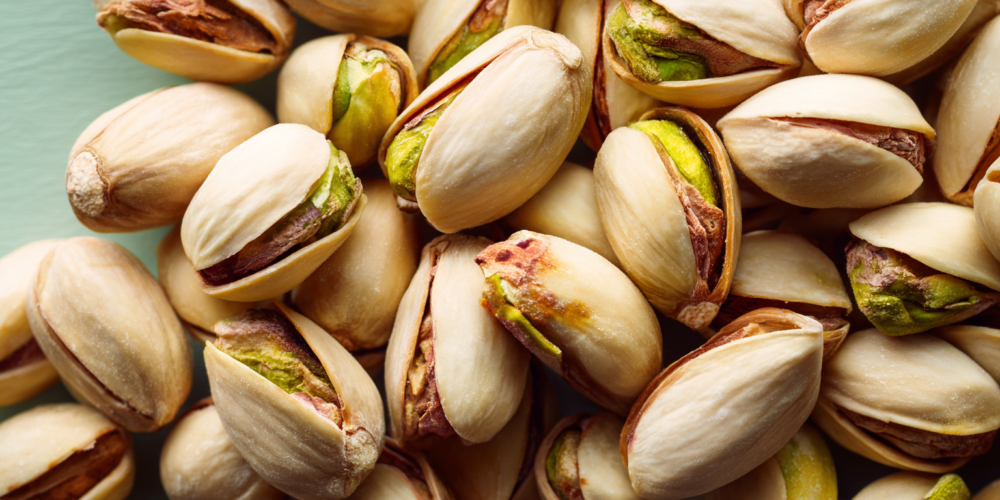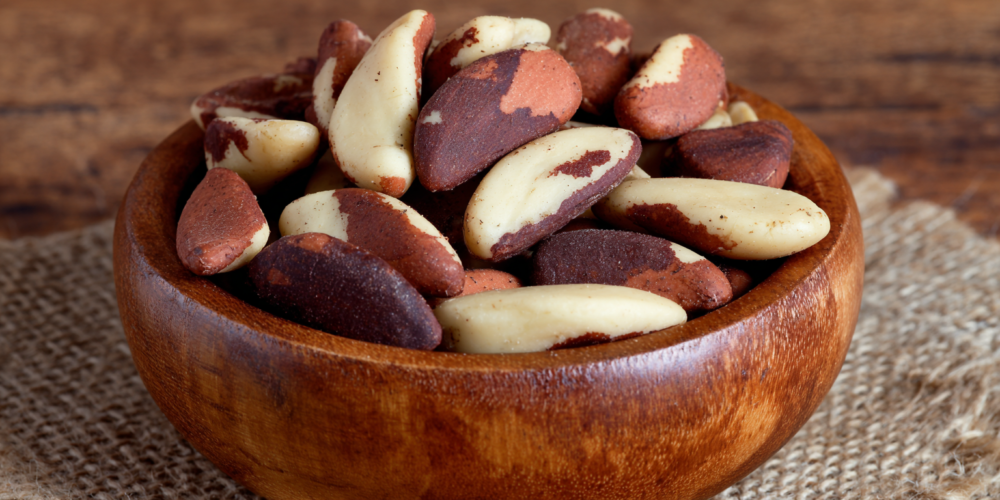
When it comes to healthy eating, nuts are often praised for their benefits for the heart, brain, and weight management. But here’s the thing: not all nuts are created equal. While some are packed with good stuff, others might have things we don’t want in our bodies. Even how we store and eat them can change a healthy nut into something we should probably avoid. There’s a big difference between a handful of raw walnuts and a bag of salty, fried peanuts. And buying nuts in bulk isn’t the same as picking up a pre-packaged bag. How you get them, store them, and eat them can really make a difference between a healthy food and one that could cause problems. (Based on the insights of Dr. Iñigo Martín, physician and psychologist)
✅The Best Nuts for Your Health
First, let’s talk about the top seven nuts that are great for you and how to eat them right.
➡️7. Almonds: Your Heart’s Best Friend

Almonds are full of monounsaturated fats, which are super important for your heart. Eating almonds regularly can help protect you from things like high cholesterol, high blood pressure, type 2 diabetes, and weight issues. They also help keep your blood sugar steady by slowing down how your body processes carbs, which prevents those sugar spikes we want to avoid. If you’re watching your weight, almonds can help you feel full longer because of their fiber and protein, meaning fewer cravings and less snacking. They’re also rich in vitamin E, which protects your cells and helps your immune system. So, every time you eat almonds, you’re nourishing your body inside and out.
- Key Takeaway: Eat a handful (about 30 grams) of raw, unpeeled almonds daily. For better blood sugar control, eat them 15 minutes before meals.
➡️6. Walnuts: Brain and Heart Powerhouses

Walnuts are amazing for your brain because of their healthy fats, which your body needs but can’t make on its own. These fats protect your brain from damage and inflammation. As we get older, our brain cells change, affecting memory, mood, and focus. The fats in walnuts can help slow this down. For your heart, walnuts are fantastic. Their fatty acids help lower bad cholesterol (LDL) and raise good cholesterol (HDL), leading to cleaner arteries and a lower risk of heart problems.
- Key Takeaway: Eat a handful (4-5 walnuts) daily. Soaking them in water for 8 hours before eating can help your body absorb their nutrients better. You can also add them to salads, smoothies, or sauces.
➡️5. Pistachios: Great for Weight and Gut Health

Pistachios are special because of their unique mix of protein and fiber, making them great for managing your weight and keeping your heart healthy. The fiber in pistachios forms a gel in your gut, slowing down digestion. This makes you feel full longer and helps reduce cravings. Plus, this fiber feeds the good bacteria in your gut, which improves digestion, immunity, metabolism, and even your mood. It’s like feeding an inner garden that takes care of your whole body.
- Key Takeaway: Eat a handful of pistachios daily. Buying them in their shells can help you eat slower and be more aware of how much you’re eating. They also have fewer calories than many other nuts.
➡️4. Brazil Nuts: Selenium Superstars

Brazil nuts are unique because they’re the richest natural source of selenium. Just one Brazil nut gives you all the selenium you need in a day! Selenium is vital for your thyroid, which controls your metabolism, energy, and mood. If you don’t get enough selenium, your thyroid can’t work right, making you feel tired, low on energy, and possibly gain weight. Selenium also protects your cells from daily damage caused by pollution, stress, or processed foods, making your body better at fighting off threats. These nuts also have copper (for strong hair), magnesium (for bones and nerves), and phosphorus (for energy and healthy teeth).
- Key Takeaway: Eat just one or two Brazil nuts a day. Too much selenium can cause problems like hair loss or fatigue.
➡️3. Hazelnuts: Sustainable and Nutrient-Rich

Hazelnuts offer more than just a delicious taste. They’re full of vitamins A and B, which are essential for your body. Vitamin A boosts your immune system and improves vision, while B vitamins are vital for your nervous system and energy levels. A surprising fact about hazelnuts is that they need less water to grow than almonds, making them a more sustainable choice.
- Key Takeaway: Eat a handful (about 30 grams) of raw hazelnuts daily. If you prefer them toasted, do it yourself at home on low heat for about 10 minutes to keep their nutrients intact.
➡️2. Chestnuts: Low-Fat and Vitamin C Packed

Chestnuts stand out because they’re very low in fat, making them a great option if you’re watching your weight but still want the benefits of nuts. They’re also one of the few nuts that provide vitamin C, which is great for your immune system, skin, and collagen production. Chestnuts are good for your heart, helping keep your arteries clean and blood pressure stable. Their fiber also helps your digestion and gut health. Unlike fattier nuts, chestnuts have a low glycemic index, so they won’t spike your blood sugar, making them a good snack for people with diabetes or prediabetes.
- Key Takeaway: Eat four to five chestnuts daily. You can eat them raw, but most people prefer them roasted for easier digestion. Make a small cut in the skin before roasting to prevent them from exploding.
➡️1. Pecans: Antioxidant and Mineral Power

Pecans are packed with antioxidants, making them excellent for protecting your cells from damage. They’re also rich in minerals like calcium and magnesium, which are vital for your bones and muscles. Potassium in pecans helps your nerves work well, regulates blood pressure, and prevents muscle cramps. For men, pecans can help maintain a healthy prostate by reducing inflammation. Pecans have very few carbs, making them a perfect snack if you’re managing blood sugar or weight. Unlike some other nuts, pecans don’t lose their good qualities when toasted.
- Key Takeaway: Eat a handful of pecans daily, either as a snack or added to your meals. You can crush them and sprinkle them over salads, or lightly toast them with a bit of cinnamon if you don’t like their natural taste.
📌Nuts to Be Careful With (or Avoid)
Now that we’ve covered the best nuts, let’s look at five common ones that might not be as good for you, including the number one nut you should avoid.
⚠️A. Macadamia Nuts: High in Calories

Macadamia nuts are tasty, but you should eat them carefully if you’re watching your weight. They’re one of the most calorie-dense nuts, with over 200 calories in just a small handful. They’re almost entirely fat, and while it’s mostly good monounsaturated fat, the sheer amount can be too much. Their creamy taste makes it easy to eat too many, quickly adding up calories. If you’re trying to build muscle or control your weight, macadamias aren’t your best bet because they have very little protein compared to other nuts. Also, processed macadamias often have added salt, sugar, and other things that increase calories and can lead to water retention or blood sugar spikes.
- Key Takeaway: Limit yourself to four or five natural, unprocessed macadamia nuts a day. You can lightly toast them at home without adding salt. Mix them with higher-protein nuts like almonds or pistachios if you’re trying to control your weight.
⚠️B. Peanuts: Allergy and Toxin Risks

Peanuts are widely eaten, but they come with a few concerns. First, they cause more allergies than any other food, and these reactions can be serious. Second, there’s the issue of aflatoxins, which are toxic substances produced by certain molds that can harm your liver and increase the risk of liver disease. Third, peanuts are high in omega-6 fats. While some omega-6 is fine, too much can cause inflammation in your body, leading to problems like arthritis, muscle pain, swelling, or poor digestion. Many store-bought peanuts are also roasted in low-quality oils and covered in sugar or salt, turning them into a food that can promote weight gain, inflammation, and other health issues.
- Key Takeaway: If you eat peanuts, choose unsalted versions and eat them in moderation (about 25 grams twice a week). Store them in an airtight container in the fridge to prevent mold.
⚠️C. Pine Nuts: Taste Alteration and Cost

Pine nuts have healthy fats, but they can cause something called “pine mouth,” a temporary taste disorder that leaves a metallic taste in your mouth for several days. While not dangerous, it can be very annoying. Also, pine nuts are one of the most expensive nuts. While they are nutritious, there are more affordable options that offer similar benefits.
- Key Takeaway: Eat pine nuts in moderation, as part of a varied diet. A small handful once or twice a week is usually fine.
⚠️D. Horse Chestnuts: Toxic and Not for Eating

Horse chestnuts look harmless, but they are dangerous and often confused with edible chestnuts. Their bitter taste is a warning sign. Horse chestnuts contain a compound called esculin, which can cause severe abdominal pain, vomiting, diarrhea, and even muscle weakness or paralysis in serious cases. While horse chestnuts are used in medicine, it’s always under strict control and in special forms that remove the toxic compounds. It’s important to know how to tell them apart: horse chestnuts usually have a thicker, spikier shell, and the nut inside is rounder and shinier than common chestnuts. If you’re unsure, buy chestnuts from trusted stores. Some European countries even put signs on horse chestnut trees warning that their fruits are not edible.
- Key Takeaway: Never eat horse chestnuts. They are toxic. Only eat chestnuts bought from reliable sources.
⚠️E. Bitter Almonds: A Hidden Danger

Bitter almonds look just like the sweet almonds we usually eat, but they contain a compound called amygdalin, which turns into cyanide when it enters your digestive system. This is why bitter almonds are not commonly sold and their sale is controlled. Eating them can cause nausea, headaches, and even more serious problems. The taste of bitter almonds is very strong and different from sweet almonds. While there are over 30 types of almonds, only bitter ones have dangerous levels of this toxic compound. The sweet almonds you normally eat have such tiny amounts of cyanide that they are completely safe.
- Key Takeaway: Always buy almonds from trusted stores and avoid collecting wild almonds. If an almond tastes extremely bitter or makes your mouth tingle, don’t eat it.
Most nuts are healthy and great to include in your daily diet. You just need to be careful with a few to stay safe.
Source: Dr. Iñigo Martín

